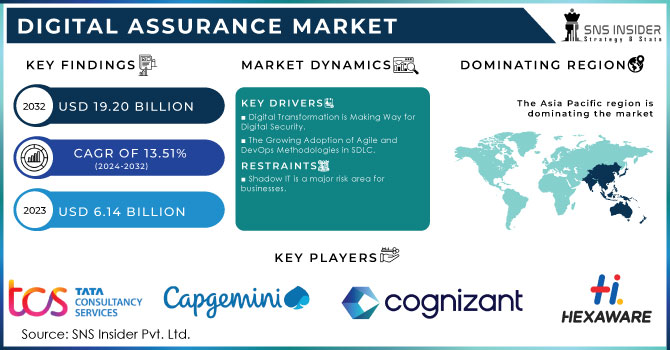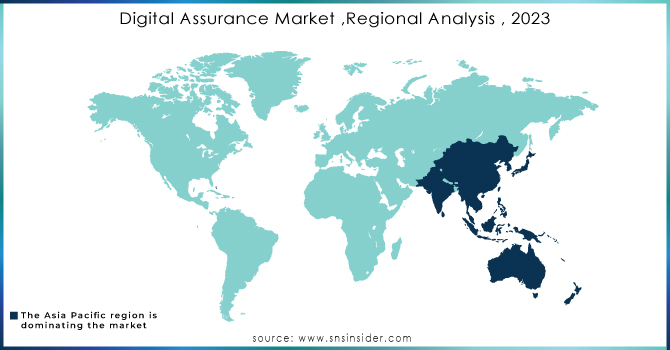Digital Assurance Market Report Scope & Overview:

Get more information Digital Assurance Market - Request Sample Report
The Digital Assurance Market size was valued at USD 6.14 Billion in 2023 and is expected to reach USD 19.20 Bn by 2032 and grow at a CAGR of 13.51% over the forecast period 2024-2032.
In today's digital world, organizations must accomplish a successful digital transformation while simultaneously providing trustworthy digital quality assurance to prevent degrading the consumer experience. Standard quality assurance has sufficed to deliver a better customer experience and integrated testing of various embedded software, digital devices, and big data. Not only does digital assurance include the testing of apps for various platforms such as social, mobile, internet of things, and big data, but it also includes the assurance of projected business results as a result of digital transformation initiatives. Digital assurance includes network capabilities, interoperability, optimal performance, and enhanced security, all of which contribute to a better customer experience.
In the current market context, organizations must focus more on creating seamless experiences than on responding to customer requests for products and services. By leveraging digital assurance's omnichannel capabilities, organizations may provide automated solutions with improved accessibility, a more seamless experience, and decreased wait time. Furthermore, the digital revolution has given rise to a slew of new security dangers.
Digital Assurance Market Dynamics:
KEY DRIVERS:
-
Digital Transformation is Making Way for Digital Security.
-
The Growing Adoption of Agile and DevOps Methodologies in SDLC.
-
The growing use of test automation reduces operational costs while improving QA.
-
API Monitoring is becoming increasingly important in the digital economy.
RESTRAINTS:
-
Shadow IT is a major risk area for businesses.
OPPORTUNITY:
-
Testing Advances Through the Use of AI and Machine Learning Technologies.
-
Service virtualization provides a risk-free testing environment.
-
Open-Source Testing Instruments Investigate Untapped Potential.
CHALLENGES:
-
Inadequate Knowledge and Reluctance to Adopt New Testing Methods.
-
Inadequate test coverage, ranging from testing every possible input to testing every possible variable.
-
Operational Problems.
IMPACT OF COVID-19:
Due to lockdowns, travel bans, and commercial shutdowns, COVID-19 has had an impact on economies and businesses in a number of nations. The closure of numerous facilities and companies has disrupted global supply chains, severely impacting manufacturing, delivery schedules, and product sales in the worldwide market. Few corporations have already acknowledged potential delays in product delivery and sales slumps in the future. Furthermore, worldwide travel bans enforced by nations in Europe, Asia-Pacific, and North America are having an impact on commercial cooperation and partnership prospects.
Digital Assurance Market Overview
During the projected period, manual testing is predicted to hold the biggest market share. Before a software product is published to the public, manual testing is done to detect bugs and feature concerns. Manual testing is used by the tester to analyze the critical aspects of a software product. Analysts conduct test cases and generate summary error reports without the usage of specialized automation tools.
Security testing is predicted to be a rapidly rising sector. The functional testing type is expected to have the largest market share during the projection period due to increased demand for validating and verifying the performance of software or applications that execute in compliance with requirement specifications. Security Testing is expected to expand at the quickest CAGR throughout the projected period, as vulnerabilities have gotten more complex and sophisticated, boosting the demand for Security Testing to address risks.
The Cloud technology category is predicted to have the largest market share due to the growing need to supply very scalable IT-enabled capabilities to various clients that employ internet technologies. Cloud technology is extensively utilized by organizations all over the world since it is cost-effective and can be established even with minimal IT infrastructure. The Mobile technology category is expected to develop at the quickest rate due to the rising usage of mobile devices to access the internet, business data, communication, and tailored information. Mobile technology has advanced over time and is now commonly utilized to speed up company procedures.
During the projected period, the Manufacturing vertical is predicted to hold the greatest market share. Because digital testing in the Manufacturing vertical enables highly efficient and automated Manufacturing tests, select a wireless communication tester for sophisticated Manufacturing devices to perform non-signaling tests on connected devices and support cellular and non-cellular standards. Because of the increasing expansion of Ecommerce and its numerous applications, which demand the need for digital assurance, the Retail and eCommerce industry is expected to grow at the quickest rate.
Digital Assurance Market Regional Analysis
The Asia Pacific area is predicted to develop significantly, thanks mostly to the region's economy, which has enormous potential to progress toward digital transformation. As the area has advanced toward a digital future, COVID-19 has increased the urgency by bringing instances such as workplaces, customer, and partner engagement online. With the increased change, quality assurance must also manage many competing agendas. These include the need to accommodate a fast-changing technological landscape as well as the demand for greater speed in delivering both while assuring omnichannel user experiences. Furthermore, growing economies such as India are embracing the digital revolution, which is being driven by government programs and technical vendor investments.

Need any customization research on Digital Assurance Market - Enquiry Now
KEY PLAYERS:
The major key players are Tata Consultancy Services Limited, Wipro, Capgemini, Hexaware, Cognizant, Cigniti, Accenture, Micro Focus, Maveric Systems, DXC Technology Company & Other Players
| Report Attributes | Details |
|---|---|
| Market Size in 2023 | USD 6.14 Billion |
| Market Size by 2032 | USD 19.20 Billion |
| CAGR | CAGR 13.51% From 2024 to 2032 |
| Base Year | 2023 |
| Forecast Period | 2024-2032 |
| Historical Data | 2020-2022 |
| Report Scope & Coverage | Market Size, Segments Analysis, Competitive Landscape, Regional Analysis, DROC & SWOT Analysis, Forecast Outlook |
| Key Segments | • by Testing Mode (Manual Testing and Test Automation) • by Testing Type (Application Programming Interface Testing, Network Testing, Performance Testing, Security Testing, and Others) • by Technology (Mobile, Cloud, Analytics, and social media) • by End-Use (BFSI, Retail and eCommerce, Manufacturing, and Others) |
| Regional Analysis/Coverage | North America (USA, Canada, Mexico), Europe (Germany, UK, France, Italy, Spain, Netherlands, Rest of Europe), Asia-Pacific (Japan, South Korea, China, India, Australia, Rest of Asia-Pacific), The Middle East & Africa (Israel, +D11UAE, South Africa, Rest of Middle East & Africa), Latin America (Brazil, Argentina, Rest of Latin America) |
| Company Profiles | Tata Consultancy Services Limited, Wipro, Capgemini, Hexaware, Cognizant, Cigniti, Accenture, Micro Focus, Maveric Systems, and DXC Technology Company |
| Key Drivers | •Digital Transformation is Making Way for Digital Security. •The Growing Adoption of Agile and DevOps Methodologies in SDLC. |
| Market Restraints | •Shadow IT is a major risk area for businesses. |

